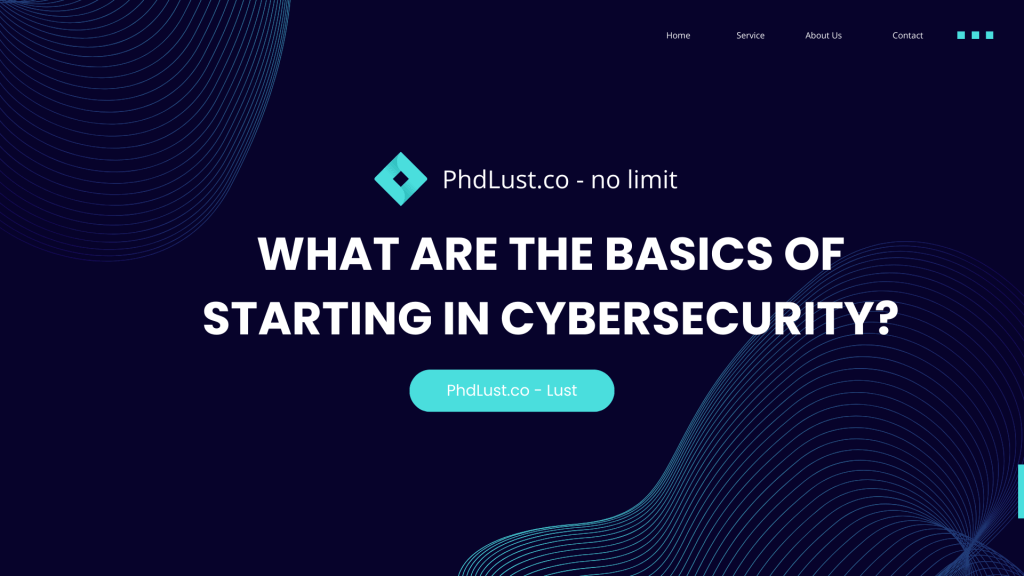What are the basics of starting in Cybersecurity?
So, you’re considering a career in cybersecurity? Excellent choice! But where do you begin? Let’s break down the basics to kickstart your journey into this cyber-security field.
As you well know with cybersecurity has become a critical concern for individuals, businesses, and governments alike. With the increasing frequency and sophistication of various cyber attacks, the need for skilled cybersecurity professionals has never been greater.
Importance of Cybersecurity
- Protecting Sensitive Information
- Preventing Cyber Threats And Attacks
Cybersecurity is crucial for safeguarding sensitive data, including personal information, financial records, and intellectual property, from unauthorized access, theft, and manipulation. It plays a vital role in ensuring the safety of user’s sensitive data on websites, protecting against potential hackers.
Furthermore, cybersecurity measures are essential for preventing and mitigating various cyber threats and attacks, such as malware infections, phishing scams, ransomware attacks, and data breaches. These measures are necessary to maintain the integrity and security of online platforms and to safeguard against potential vulnerabilities.
Moreover, cybersecurity goes beyond merely protecting personal data; it extends to safeguarding all aspects of digital life, from social media accounts to critical company information. In essence, it serves as a digital security guard, providing comprehensive protection for individuals and organizations alike in the online realm.
Key Concepts in Cybersecurity
- Confidentiality, Integrity, and Availability (CIA)
- Risk Management
- Vulnerability Assessment
In cybersecurity, we often talk about the CIA triad (confidentiality, integrity and availability), not the agency, but Confidentiality, Integrity, and Availability (CIA). These three elements form the bedrock of keeping our digital world safe and secure.
Confidentiality is all about making sure that only authorized people can access sensitive information. It’s like keeping a secret locked away in a hidden vault, away from prying eyes.
Integrity ensures that our data remains unchanged and accurate. It’s like making sure that the ingredients in our favourite recipe are always the same, so we can trust the outcome every time.
Availability means that our data and resources are always accessible when we need them. It’s like having our favourite book ready to read whenever we want, without any obstacles in the way.
Risk management is like being a detective, always on the lookout for potential threats and vulnerabilities. It involves identifying, assessing, and mitigating risks to keep our digital assets safe from harm.
Vulnerability assessment is like giving our digital systems a check-up to identify any weak spots that could be exploited by cyber attackers. By finding and fixing these vulnerabilities, we can strengthen our defences and protect against potential threats.
Basic Principles of Cybersecurity
Least Privilege
Think of the principle of least privilege as giving someone the exact key they need to open a door and nothing more. It’s like having a security guard at the entrance of a building who only lets in people with the right credentials, ensuring that no unauthorized individuals gain access to sensitive areas.
Defense-in-Depth
Imagine your home has multiple layers of security: locks on doors, alarms, and a security system. Defense-in-depth works the same way in cybersecurity, with each layer adding an extra level of protection. It’s like having a sturdy fortress with multiple walls and barriers to keep intruders out.
Security by Design
Security by design is like building a house with security features in mind from the very beginning. Instead of adding locks and alarms as an afterthought, they’re integrated into the design and construction process. It’s like building a strong foundation for a house to withstand any threats or attacks.
Skills for Cybersecurity
Technical Skills
Cybersecurity professionals require technical expertise in areas such as network security, cryptography, penetration testing, and malware analysis to effectively secure systems and infrastructure.
Analytical and Problem-Solving Skills
Analytical and problem-solving skills are essential for cybersecurity professionals to analyze complex security incidents, identify root causes, and develop effective solutions to mitigate risks and vulnerabilities.
Communication and Teamwork
Effective communication and teamwork skills are critical for cybersecurity professionals to collaborate with colleagues, communicate security risks and recommendations to stakeholders, and coordinate incident response efforts.
Educational and Training Requirements
Formal Education vs. Self-Study
While formal education in cybersecurity or related fields can provide a solid foundation, many cybersecurity professionals also acquire knowledge and skills through self-study, online courses, and practical experience.
Certifications and Credentials
Obtaining relevant certifications and credentials, such as Certified Information Systems Security Professional (CISSP), Certified Ethical Hacker (CEH), and CompTIA Security+, can enhance credibility and demonstrate proficiency in cybersecurity.
Continuous Learning and Professional Development
Cybersecurity is a rapidly evolving field, requiring professionals to stay updated with the latest technologies, threats, and best practices through continuous learning, training, and professional development activities.
Career Paths in Cybersecurity
Penetration Testing
Penetration testers assess the security of systems and networks by attempting to exploit vulnerabilities and weaknesses to identify potential entry points for attackers and recommend remediation measures.
Security Analysis
Security analysts monitor and analyze security events and incidents, investigate security breaches and intrusions, and develop security policies and procedures to protect against cyber threats.
Incident Response
Incident responders are responsible for promptly detecting, analyzing, and responding to security incidents and breaches, coordinating incident response efforts, and implementing measures to contain and mitigate the impact of incidents.
Security Engineering
Security engineers design, implement, and maintain security solutions and systems, such as firewalls, intrusion detection and prevention systems (IDPS), and encryption mechanisms, to protect against cyber threats and vulnerabilities.
Getting Started in Cybersecurity
Building a Solid Foundation
Begin by acquiring a solid foundation in cybersecurity fundamentals, including understanding key concepts, principles, and best practices, and gaining hands-on experience through labs, projects, and internships.
Networking and Mentorship
Network with cybersecurity professionals, join industry groups and associations, attend conferences and events, and seek mentorship opportunities to learn from experienced professionals and expand your professional network.
Gaining Hands-on Experience
Gain practical experience and skills through internships, volunteer work, part-time jobs, and personal projects, and consider participating in capture the flag (CTF) competitions and cybersecurity challenges to hone your skills and knowledge.
Conclusion
Starting a career in cybersecurity can be both challenging and rewarding, requiring dedication, continuous learning, and a passion for technology and security. By acquiring the necessary skills, certifications, and experience, and staying updated with the latest developments in the field, you can embark on a successful and fulfilling cybersecurity career.
FAQs
What are the main challenges in starting a career in cybersecurity?
Starting a career in cybersecurity can be tough due to the field’s fast-paced nature, complex threats, and high demand for skilled professionals.
How long does it take to become proficient in cybersecurity?
Becoming proficient in cybersecurity varies based on factors like experience and education, but typically takes several years of study and practical experience.
What are some common misconceptions about cybersecurity careers?
Common misconceptions include thinking cybersecurity is only for tech wizards, that a degree is a must-have, and that professionals spend all their time hacking.
Is a degree necessary for a career in cybersecurity?
While helpful, a degree isn’t always required. Many professionals enter the field through self-study, certifications, and hands-on experience.
What are the future prospects for cybersecurity professionals?
The future looks bright, with rising demand across industries, technological advancements creating new opportunities, and cybersecurity remaining crucial in the face of evolving threats.




